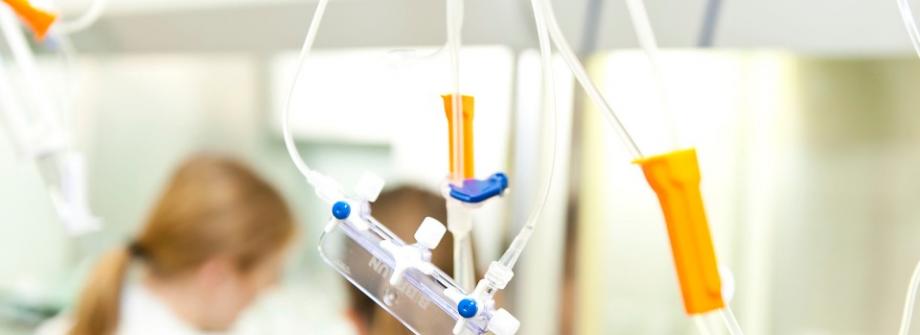
July 2021 Clinical Case of the Month
Title: Prophylactic tyrosine kinase inhibitor after allogeneic hematopoietic cell transplantation for Philadelphia chromosome‐positive acute lymphoblastic leukemia
Submitted by: Syed Ali Abutalib and Nicolaus Kröger
Physician expert perspective: Jacob M. Rowe
48-year-old male with Philadelphia chromosome positive acute lymphoblastic leukemia (Ph+ ALL) comes for a routine 12-month follow-up visit after HLA-MSD allogeneic hematopoietic cell transplantation (allo-HCT). Fortunately, she had an uneventful post-transplant course without acute graft-versus-host disease or infections. Currently, she is on maintenance dasatinib for last 6 months without (hematologic or non-hematologic) toxicity. Other medications include prophylactic acyclovir and sulfamethoxazole/trimethoprim. As planned, she stopped prophylactic oral immunosuppression almost 5 months ago. Current, bone marrow aspirate analysis demonstrates morphologic complete remission.
She would like to know your opinion about the total duration of prophylactic tyrosine kinase inhibitor therapy after allo-HCT.
What is the most appropriate answer to patient’s inquiry?
A. She could safely stop tyrosine kinase inhibitor
B. She could continue tyrosine kinase inhibitor for another 6 months
C. She could continue tyrosine kinase inhibitor for another 18 months
D. There is consensus statement to answer her question, but level 1 evidence is lacking
Expert Perspective by Dr. Jacob M. Rowe
There are several important issues to consider regarding the best advice for continuation of tyrosine kinase inhibitor (TKI) therapy in this particular patient. First, we do not know the specific pre-transplant therapy and, in particular, whether she was MRD-negative for BCR/ABL1 by quantitative polymerase chain reaction (PCR) prior to allo-HCT. In addition, we are not told if the patient underwent the transplant in CR1 or beyond. If the patient was MRD-positive pre-transplant, most practitioners would recommend continuation of post-transplant TKI for a long duration---probably not less than 3 years of demonstrated MRD-negativity. Assuming the patient was transplanted in CR1 and was MRD-negative pre-transplant this is indeed an area of ongoing uncertainty. Consider that if the clinical decision was made to transplant such a patient---in itself a recommendation being intensively investigated in clinical trials—this entails the inherent assumption of the presence of residual disease below the current level of detection. A prevailing concept, although unproven, surmises that patients would need more than the pre-transplant conditioning and post-transplant alloreactivity to eradicate the Philadelphia-positive clone, a premise confirmed by the of occurrence of relapses even after an allogeneic transplant. Hence, the common practice of administering TKI therapy also post-transplant. This is backed by studies1-2 showing improved outcomes for patients receiving TKIs post-transplant, compared with historic controls. A recent position statement by the European Society for Blood and Marrow Transplantation (EBMT) confirmed the lack of grade 1 evidence for post-transplant TKI.3 This consensus recommended that for patients in CR1, TKI be given for 12 months of continuous MRD-negativity. A large ongoing US Intergroup study (ECOG-ACRIN EA9181) recommends TKI for 3 years and a recent Japanese study recommended at least 2 years of TKI therapy.2 Irrespective, there is unanimous agreement for frequent MRD monitoring and any decision to stop TKI must be followed closely for at least two years.
Correct Answer – D
References
1. Warraich Z, Tenneti P, Thai T, Hubben A, Amin H, McBride A, Warraich S, Hannan A, Warraich F, Majhail N, Kalaycio M, Anwer F. Relapse Prevention with Tyrosine Kinase Inhibitors after Allogeneic Transplantation for Philadelphia Chromosome-Positive Acute Lymphoblast Leukemia: A Systematic Review. Biol Blood Marrow Transplant. 2020 Mar;26(3):e55-e64. doi: 10.1016/j.bbmt.2019.09.022. Epub 2019 Sep 23. PMID: 31557532.
2. Nakasone H, Kako S, Mori T, Takahashi S, Onizuka M, Fujiwara SI, Sakura T, Sakaida E, Yokota A, Aotsuka N, Hagihara M, Tsukada N, Hatta Y, Usuki K, Watanabe R, Gotoh M, Fujisawa S, Yano S, Kanamori H, Okamoto S, Kanda Y. Stopping tyrosine kinase inhibitors started after allogeneic HCT in patients with Philadelphia chromosome-positive leukemia. Bone Marrow Transplant. 2021 Jan 8. doi: 10.1038/s41409-020-01206-5. Epub ahead of print. PMID: 33420396.
3. Giebel S, Czyz A, Ottmann O, Baron F, Brissot E, Ciceri F, Cornelissen JJ, Esteve J, Gorin NC, Savani B, Schmid C, Mohty M, Nagler A. Use of tyrosine kinase inhibitors to prevent relapse after allogeneic hematopoietic stem cell transplantation for patients with Philadelphia chromosome-positive acute lymphoblastic leukemia: A position statement of the Acute Leukemia Working Party of the European Society for Blood and Marrow Transplantation. Cancer. 2016 Oct;122(19):2941-51. doi: 10.1002/cncr.30130. Epub 2016 Jun 16. PMID: 27309127.
Contacts
Syed Ali Abutalib, MD
Associate Director, Hematology and Cellular Therapy Program
Director, Clinical Apheresis Program
Cancer Treatment Centers of America, Zion, Illinois
Associate Professor, Rosalind Franklin University of Medicine and Science
Email: abutalib110@gmail.com
Nicolaus Kröger, MD
Professor and Medical Director of the Department of Stem Cell
Transplantation at the University Hospital Hamburg-Eppendorf, Germany
University Hospital Hamburg, Hamburg, Germany
Correspondence: Nicolaus Kröger, MD
Email: nkroeger@uke.uni-hamburg.de
Expert Perspective
Jacob M. Rowe
Professor Emeritus, Technion, Israel Institute of Technology, Haifa, Israel
The Ann and Pinky Sohn Chair in Hemato-Oncology, Shaare Zedek Medical Center, Jerusalem, Israel
Email: rowe@rambam.health.gov.il
Future Clinical Case of the Month
If you have a suggestion for future clinical case to feature, please contact Nicolaus Kröger.